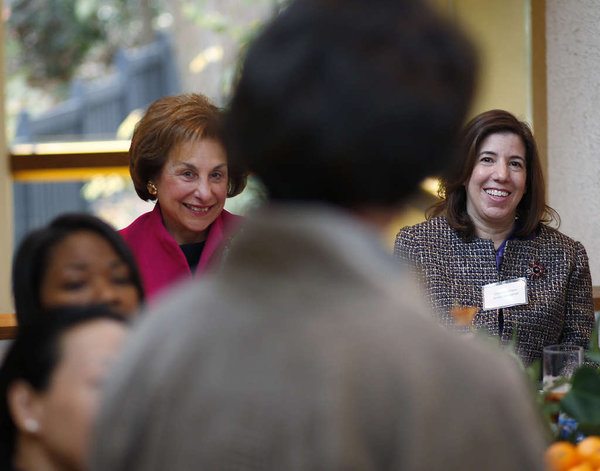By Harold Brubaker
The Philadelphia Inquirer.
When Leslie Richards became a Montgomery County commissioner in 2012, she was inundated by men angling for positions on boards, commissions, and authorities.
“It did not take much longer for me to realize that women were unaware of these opportunities,” which give individuals influence and can be springboards to higher-level positions, Richards said.
“It was quite frustrating, and I have to say it made me angry,” she said. “I had to do something about it, but I wasn’t quite sure what I could do.”
The result of many long conversations with friends and advisers is Plan W.
It’s a political action committee that will support candidates for positions in local and county government across Pennsylvania — men and women, Democrats and Republicans — who pledge to boost the number of women in prominent staff and board positions.
Plan W has raised about $50,000 so far this year, including $20,000 at a launch event Oct. 1 attended by more than 200, said Richards, a Democrat and honorary chair of the new effort.
The committee had its second event Sunday, a reception at the Abington Township home of supporter Harriet Weiss, who owns CRW Graphics, a printing and marketing company in Pennsauken with 118 employees.
The goal was to bring together “very well-connected women who really believe in this cause and will help us raise funds,” Richards said.
The 14 women at the meeting, ranging from the 30s to the 70s in age, included lawyers, business owners, and nonprofit executives, as well as women who have climbed far up the corporate ladder.
One of them is Nance K. Dicciani, a retired chemical-industry executive and member of the board of Halliburton Co., which is planning a hostile takeover attempt of rival oil-field services firm Baker Hughes.
Dicciani, who retired in 2008 as president and chief executive of Honeywell International Inc.’s $5 billion specialty materials business group, applauded the goals of Plan W.
“It’s a matter of getting women to know how the system works,” Dicciani, of Fort Washington, said before the meeting.
A common theme during a brunch discussion was the reluctance of women to volunteer for positions of influence.
“Women tend to need to be asked, several times,” said Kimberly G. Sheppard, executive director of the Whitemarsh Foundation and a member of the Plan W board of directors.
A key theory behind Plan W is that getting more women in leadership will open pathways for more women to follow.
Richards, 47, is an example of what can happen.
An environmental planner by trade, she was asked to serve on the Whitemarsh Township Parks & Recreation Board.
That led to a position on the local Planning Commission, where she became chair, and then to the Township Commission, where she started appointing women when possible.
Now at the county level, Richards says she has made it a top priority to make sure women are considered for every opening that comes before the commissioners. They appoint individuals to more than 30 boards, including local county boards, such as the Planning Commission, but also to regional boards, such as SEPTA.
Since 2012, Richards and her fellow commissioners, Josh Shapiro, a Democrat, and Bruce L. Castor Jr., a Republican, have appointed at least one woman to each of 11 boards that previously had none, Richards said.
Women have a strong presence on the boards of “do-good” sectors, such as health care, arts, and human services. “That’s not where the powerbrokers are,” said Ellen Toplin, a retired marketing and publics relations executive and a member of the Plan W board.
Weiss, the host of Sunday’s Plan W gathering, had a typical resumé for a woman active on boards, serving on the boards of United Way of Greater Philadelphia and Southern New Jersey, the University of the Arts, and CeaseFirePa.
Then, six months ago, she was appointed to the seven-member board of the Montgomery County Higher Education and Health Authority, a key gatekeeper for organizations that want to borrow money in the municipal bond market.
“We’re half of the population, so I think we should be in key decision-making roles. This is a way of opening the door and doing that,” Weiss said of Plan W. “We have to establish women as ready and capable to serve.”














































































































































































































































































































































































